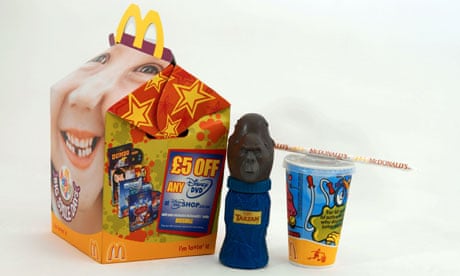Silicon Valley, the undisputed leader of the technology revolution, is seeking to add a new accolade to its reputation by becoming the leader of the fight against obesity induced by fast food.
Elected officials in Santa Clara County, the area to the south of San Francisco that covers most of Silicon Valley, have introduced a law banning restaurants from offering toys with any children's meals that fail to meet national health criteria.
In other words, the Happy Meal is for the chop. It is believed to be the first such law anywhere in the world.
In tune with the liberal, progressive and future-focused nature of its technologically proficient residents, Silicon Valley is already at the forefront of the food revolution in the US. Two years ago it became one of the first areas to force food chains to display the calorie count of each meal on menus and noticeboards, a move that was emulated in other areas, including New York city.
Now its board of supervisors, the equivalent of a local council in the UK, has moved to extend the attack on childhood obesity by banning a system that rewards children for eating unhealthy food. Ken Yeager, the supervisor who devised the ban, told the San Francisco Chronicle that the aim was to break "the link between unhealthy food and prizes".
"Obviously, toys in and of themselves do not make children obese. But it is unfair to parents and children to use toys to capture the tastes of children when they are young and get them hooked on eating high-sugar, high-fat foods early in life."
The meals have become a staple of the fast-food chains, spawning an entire industry of plastic toys. Animaniacs, the McDonald's Happy Meal toys from the 1990s, Ronald McDonald combs and Aladdin hidden treasures from Burger King (1994) have all become collectors' items in their own right.
A two-hour debate preceded the board's vote /today and heard testimony from health experts as well as fast-food outlets. McDonald's has said it was disappointed by the law as its Happy Meals provided important nutrients to children.
Under the ban, restaurants will be fined up to $1,000 (£659) for every meal they are caught selling with a toy, should that meal be deemed unhealthy by federal standards. Specifically, the meals must not contain more than 485 calories or 600mg of salt and must not have more than 35% of their calories from fat or 10% from added sweeteners.
The ban will kick in in 90 days' time to give restaurant owners time to change their menus.
Obesity levels in the Santa Clara are running at one in four children, compared with fewer than one in five nationally. The US has one of the highest obesity problems in the world.
The issue of obesity among US children has been highlighted in recent weeks by the TV chef, Jamie Oliver. He has transported his campaign to improve Britain's school dinners across the Atlantic to West Virginia, which is deemed to have the highest child obesity levels in the country.
